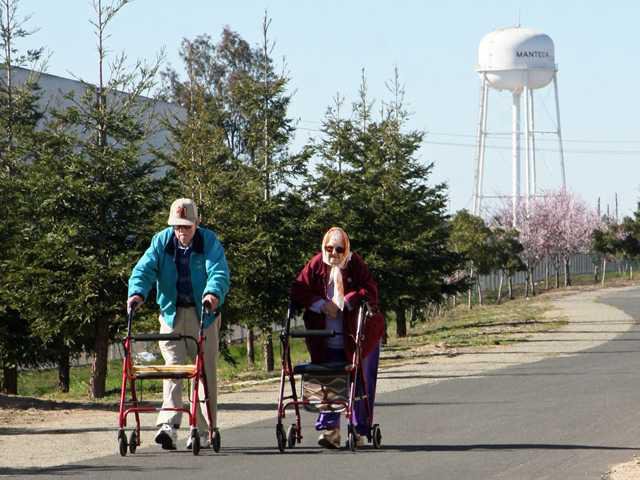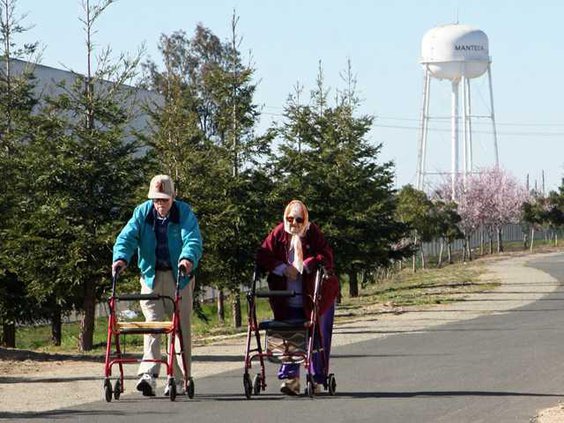They are two conspicuous figures on the Tidewater Bike Path.
He is a wearing a tan baseball cap, mainly utilitarian, that matches the color of his pants. Her head covering does double duty as a protective gear covering her coiffed wavy hair and as an accessory that delicately frames her face with the pointy ends of the floral scarf artfully tied like a flowing ribbon beneath her chin.
They are both wearing sunglasses; hers a darker one.
Their foot gears are comfortable walking shoes.
They are both pushing identical red-trimmed four-wheeled walkers equipped with convenient seats.
Their steps are slow but with a purpose as they head east along Moffat Boulevard toward Spreckels Avenue, oblivious to the din of the traffic to their left and unmindful of joggers that whiz past them along the narrow asphalt.
The image of them walking as one, their hair – and his neatly trimmed mustache white as snow – draws to mind a perfect poster picture illustrating the sentiment in Robert Browning’s words: “Grow old along with me! The best is yet to be.”
They are Daniel and Leona Smith. He is 85, retired from the former Sharpe Army Depot in Lathrop in 1974. She is 83 and held jobs at the Manteca Cannery and in the circulation department of the now-defunct Manteca News at various times.
They have been traveling down the road of life together for the last 60 years – the first six years as newlyweds spent in Richmond in the Bay Area where they were married when he was 25 and she was 23. Their union was blessed with two children – one works at Kohl’s and the other at the Holiday Inn Express in Manteca – three grandchildren, and five great-grandchildren. When asked about the family statistics, Daniel deferred to his wife saying, “she’s the one who knows that stuff.”
They talked as they walked without any sign of getting breathless. They made matching leisurely steps as if they were in a parade, effortlessly pushing their walkers up and down the section of the bike path east of North Main Street.
Past the Powers Avenue intersection, they placed their identical walkers on the gravel side of the bike path facing Moffat and sat down facing the road. Together they watched the hurrying vehicles passing by the busy thoroughfare. He observed that the bike path sign denoting Powers Avenue is orientated the wrong way, the direction going east instead of north.
They talk while they walk
With the old water tower easily within their visual range, the controversy surrounding its impending demise was also drawn into their companionable conversation.
“I think they should paint it orange,” Daniel said with a poker face.
“Yeah, this is supposed to be the pumpkin city,” agreed Leona, quickly jumping in before he has hardly finished his sentence.
‘It would be a lot cheaper to paint it than to tear it down,” he continued as though his wife had not interrupted him.
He appeared to have an opinion on practically everything under the sun, especially those pertaining to local issues.
“I have a question to ask the city fathers. If there’s a shortage of water as they say, why do they keep on building more and more houses?”
Each house built would need water allocation, he said.
Then he offered an observation which, he said, could be a good way for the city to save water.
“They should build houses with the water heater closer to the bathroom. You have to use at least five gallons of cold water to get hot water to the bathroom,” he said. He would like to know, he added, what government “authority” would have the power to make that change in the houses being built.
Imagine how much precious liquid would be saved by, say, 1,000 houses, he noted.
“It’s a dang lot of water!” he stated.
“When they start telling me not to use a lot of water, that’s one thing that they can do to change” the water-shortage situation, he added.
Smiling, his wife said her husband knows everything that’s going on because he reads the Manteca Bulletin every day. It is part of his breakfast routine, she said with a laugh.
The Smiths moved to Manteca from Richmond to escape urban sprawl and population growth.
“I wanted a small town when I moved here, and look what it’s done to me,” Daniel said with a chuckle.
“(Manteca is) growing too fast and too big. I wanted a small town. (Manteca) was only 5,000 (in population) when I moved here. There was nothing past the high school – nothing but grape fields east of Manteca High School – when I moved here,” he said, sounding not just a bit nostalgic.
He sighed as he added, “But I can’t move now. I can’t afford to move. The house is paid for, so we’re stuck here.”
On second thought, he said, “It’s not too bad,” living here in Manteca.
The Tidewater Bike Path is one thing that they like about The Family City.
Daily exercise
on the bike path
For their daily exercise, they head out to the bike path. They live in the Sequoia School neighborhood, so they take their car to the newly built transit station at South Main Street and Moffat Boulevard and park their car there. That’s where they start walking. They do that practically every day “when (the weather) is nice like this,” she said Friday.
They usually go walking “in the afternoon when it’s warm,” her husband said.
“It’s too cold (to do it) in the morning,” she added, hijacking the end of her husband’s sentence once again before he can complete his thought.
Exercise is a daily routine for the Smiths.
“If you sit around just watching TV, you get stiff especially when you’re getting up to our age.” Daniel said with emphasis.
On days when it’s too hot, like in the summertime when the valley is baking in triple-digit heat, or too cold like in the winter time, or wet such as when it’s raining, husband and wife are homebound. Still, that’s not enough excuse for them to forgo their exercise routine. They have that covered, too. They have a small pedal equipment that they can place on the floor for leg exercises, and on the table to get their body muscles and arms moving.
“Just get up and move,” he simply said.
Octogenarian couple bike path fixture





